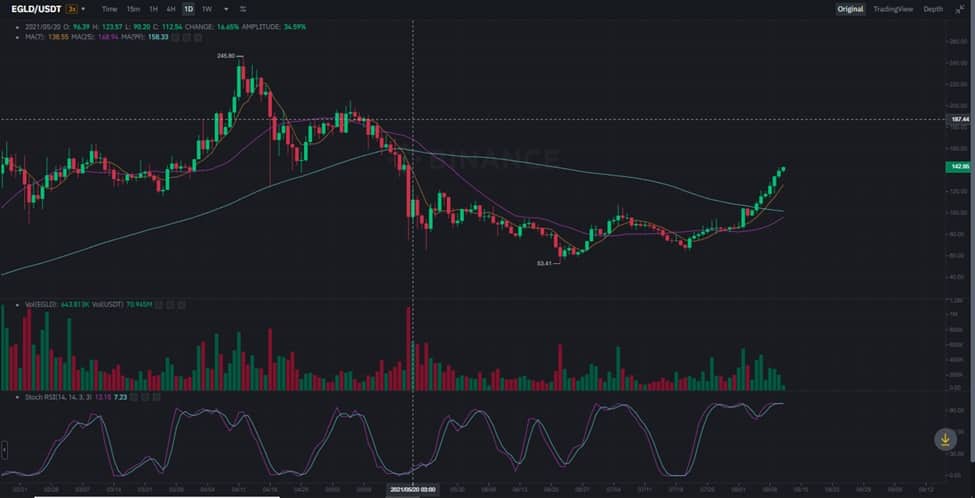
Developers Who make decentralized apps are spoilt for choice when it comes to choosing the ideal blockchain on which to create and deploy their dapps.
Unfortunately, most of those options charge hefty transaction fees, some struggle with scalability issues, and of course, there is the conversation around the impact of blockchain technology on the environment. Elrond happens to be one of the blockchains positioned to overcome those challenges but it has been flying under the radar and largely gone unnoticed. Fortunately, its native token has been performing exceptionally well thanks to the organic growth that the project has enjoyed so far, and that growth has also provided more exposure to the market.
EGLD, the native cryptocurrency on Elrond delivered impressive gains during the latest bull run. It is currently trading at $142.37 after a 2.58% gain in the last 24 hours and 40.16% in the last 7 days. Even more interesting is that the price has more than doubled during the ongoing bull run which started when it traded as low as $67.75. However, it still has some gains to cover before reaching its previous all-time high of $245.80.

Source: Binance
EGLD’s strong gains are partly supported by the overall bullish sentiments that have prevailed in the market for the better part of 2021 and also favorable tokenomics. For example, it has a low circulating supply at just 19.27 million coins which is within the same scarcity level as Bitcoin, and the utility that it provides to its native network. The coin’s maximum supply is around 31 million tokens. It also maintains the financial incentives that allow it to maintain the appeal of its proof-of-stake blockchain.
EGLD can be used to stake, pay transaction fees and also participate in governance on the Elrond blockchain. This kind of utility and its favorable tokenomics highlight the cryptocurrency’s robust growth potential even at its current price level.
Elrond recently revealed that it is the first blockchain to become carbon negative in Europe as part of its commitment to environmental conservation. It managed to achieve the status through a partnership with a company called Offsetra whose agenda is carbon footprint reduction. The collaboration is a big deal for Elrond now that the conversation about blockchain consensus mechanisms such as proof of work and their impact on the environment.
The carbon-negative status is a big deal because it might help attract more developers who are looking to roll out their decentralized services on a network committed to carbon neutrality. Elron’s appeal as a blockchain network is further enhanced by some of its other benefits such as smart contract support and a high transaction throughput which is currently at 15,000 TPS. However, the transaction speed can be scaled to more than 100,000 TPS to match any increased network demand.
Elrond has already started to attract other blockchain projects looking for the ideal blockchain on which to launch its offerings. For example, the HUMAN protocol blockchain recently announced its transition to Elrond so that it can tap into better cost efficiency, the carbon negative status, and its high transaction throughput. More DeFi projects will likely pursue a similar path soon.



Get the latest Crypto & Blockchain News in your inbox.